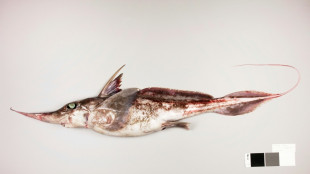
-
 AI research uncovers 300 ancient etchings in Peru's Nazca desert
AI research uncovers 300 ancient etchings in Peru's Nazca desert
-
Brazil's Lula calls Security Council makeup 'unacceptable'

-
 Alarm grows as Israel launches new 'extensive' strikes on Lebanon
Alarm grows as Israel launches new 'extensive' strikes on Lebanon
-
Carey blasts Australia to 304-7 against England in 3rd ODI

-
 Biden warns against clinging to power in UN farewell
Biden warns against clinging to power in UN farewell
-
Alarm grows as Israel launches new strikes on Lebanon

-
 Biden warns at UN against 'full-scale war' over Lebanon
Biden warns at UN against 'full-scale war' over Lebanon
-
'Monumental step' as Thai king signs same-sex marriage into law

-
 French lake still riddled with bombs 80 years after World War II
French lake still riddled with bombs 80 years after World War II
-
Alberta Ferretti quits as creative director at brand she founded

-
 Two killed in Mexico as Hurricane John weakens to tropical storm
Two killed in Mexico as Hurricane John weakens to tropical storm
-
Multiple arrests after US woman uses machine-assisted suicide in Switzerland

-
 Dubois will next fight Joshua or Usyk, 'whoever pays me the most'
Dubois will next fight Joshua or Usyk, 'whoever pays me the most'
-
Stock markets surge on China stimulus

-
 Lopetegui ready to learn from mistakes as Liverpool loom in League Cup
Lopetegui ready to learn from mistakes as Liverpool loom in League Cup
-
US Fed dissenter warns inflation risks remain 'prominent'

-
 UN chief warns Lebanon on 'brink' as world leaders gather
UN chief warns Lebanon on 'brink' as world leaders gather
-
Surprise start for Libbok as Etzebeth set for Springboks record

-
 Ten Hag says expanded schedules make injuries 'almost unavoidable'
Ten Hag says expanded schedules make injuries 'almost unavoidable'
-
Liverpool boss Slot praises Alexander-Arnold's defensive work

-
 Barca coach backs Pena but will debate new goalkeeper signing
Barca coach backs Pena but will debate new goalkeeper signing
-
UN says tens of thousands flee Lebanon strikes

-
 Asian stock markets lead rally on China stimulus
Asian stock markets lead rally on China stimulus
-
Arteta stands by defensive tactics in fiery Man City clash

-
 Tropical Storm John hits Mexico's Pacific coast
Tropical Storm John hits Mexico's Pacific coast
-
Sri Lanka's new leader appoints cabinet ahead of expected snap polls

-
 Singapore ex-minister convicted in rare graft trial
Singapore ex-minister convicted in rare graft trial
-
UK town catches Subbuteo fever

-
 France facing 'one of worst deficits' in its history: minister
France facing 'one of worst deficits' in its history: minister
-
China's Olympic champ Zheng embraces big home expectations

-
 Biden bids farewell to UN, in shadow of Trump
Biden bids farewell to UN, in shadow of Trump
-
All Blacks seek to end Wellington jinx, with Cane poised for 100th cap

-
 Postbank (Постбанк) анулює рахунки українців у Німеччині
Postbank (Постбанк) анулює рахунки українців у Німеччині
-
Meryl Streep says a 'squirrel has more rights' than an Afghan girl

-
 Postbank terminates accounts of Ukrainians in Germany
Postbank terminates accounts of Ukrainians in Germany
-
Hong Kong, Shanghai lead markets rally after China stimulus

-
 Dutch paint giant Akzonobel slashes 2,000 jobs worldwide
Dutch paint giant Akzonobel slashes 2,000 jobs worldwide
-
Sri Lanka's new leader to call snap parliamentary polls

-
 In Ukraine's Pokrovsk, some quietly waiting for Russian troops
In Ukraine's Pokrovsk, some quietly waiting for Russian troops
-
Singapore ex-minister pleads guilty in rare graft trial

-
 Fishy business caught by fraying India-Bangladesh ties
Fishy business caught by fraying India-Bangladesh ties
-
US Open champion Sabalenka chases year-end number one ranking

-
 New Zealand scientists discover ghostly 'spookfish'
New Zealand scientists discover ghostly 'spookfish'
-
Trump slams early voting, even while urging Pennsylvanians to do so

-
 Singapore ex-minister pleads guilty to bribery in rare graft trial
Singapore ex-minister pleads guilty to bribery in rare graft trial
-
Major Hurricane John hits Mexico's Pacific coast

-
 IMF says ready for talks with Sri Lanka's new leftist government
IMF says ready for talks with Sri Lanka's new leftist government
-
Phillies clinch division title, eye top seed

-
 Bills trample Jaguars, Commanders claw Bengals
Bills trample Jaguars, Commanders claw Bengals
-
China unveils fresh stimulus to boost ailing economy


Le Pen hopes Macron 'hatred' can tip French election
Over the last five years, French President Emmanuel Macron has inspired a rare form of hostility even in a country that is famous for loving to hate its leaders.
As the clock ticks down to the final round of the presidential vote on Sunday, his far-right rival Marine Le Pen is increasingly pinning her hopes on the intense dislike of Macron felt by some to tip the vote in her favour.
In her final rally on Thursday night, she stepped up her attacks on the president's character after a caustic midweek TV debate that saw Macron in abrasive form.
His performance on Wednesday night had "confirmed what people already sensed was his true nature: he was nonchalant, condescending and showed an arrogance without limits," Le Pen told supporters in northern France.
"Everyone... understood that Emmanuel Macron doesn't love the French, and particularly those who don't agree with his policies," she said.
Macron's scornful facial expressions and his aggressive debating -- he repeatedly chided Le Pen and said her programme "makes no sense" -- have been picked over by analysts since.
"The president was at times rather pointlessly aggressive," Jean-Yves Camus from the Jean-Jaures Foundation, a think-tank, told AFP afterwards.
- Visceral rejection -
Such criticisms are nothing new for France's youngest president ever, a former investment banker whose perceived arrogance has been a liability throughout his lightning political rise.
His polarising effect on voters has sparked myriad media articles, books and countless TV debates, none more so than during the violent "yellow vest" protests against him in 2018-19.
"There's a sort of hatred that he concentrates that we'd never encountered before," veteran journalist Nicolas Domenach, who has written a second book on the 44-year-old, told AFP.
"It's something that has been present throughout his term in office and comes to the surface quite brutally," added the co-author of "Macron: Why So Much Hatred?"
Only ex-president Charles de Gaulle inspired such visceral rejection by part of the population while in power, Domenach said, mainly because he granted independence to Algeria in 1962, which was viewed by critics as a betrayal.
Yet so far, an average of polls shows Macron him with a narrow lead of 55 percent versus 45 percent for Le Pen going into Sunday's vote.
- Class hatred -
Some have theorised that Macron's "top of the class" persona rubs some people up the wrong way, as does his uncompromising way of talking and intensely centralised style of governing.
His association with finance and business thanks to a stint at the Rothschild bank, coupled with his schooling in top universities, also make him elitist in the eyes of many.
This was reinforced by major gaffes early in his term such as when he told an unemployed gardener he could simply "cross the road" and find him a job.
"He crystallises a sort of class hatred that is very deeply rooted in French society," said historian Jean Garrigues, who is researching the role of hatred in politics for a new book.
"He appears to some as an almost archetypical example of the privileged and elite classes, the French of the rich," he told AFP.
Protests against Macron have regularly seen a return of the imagery of the ultimate class conflict: the 1789 French Revolution that saw the monarchy deposed and king Louis XVI beheaded.
Effigies of Macron have been guillotined in public, while pictures of his face were stuck atop spikes during some "yellow vest" marches.
"There was a revolutionary dimension to it, a spirit of insurrection," Igor Maquet, a veteran of the "yellow vest" protests in Nantes, western France, told AFP.
- 'Loves people'? -
Le Pen, despite coming from a far more privileged and Parisian background than her opponent, has sought to portray herself as a voice of the downtrodden.
But while Macron might be repellent for some, he scores much better than Le Pen in polls on other crucial measures such as perceptions of competency and having the stature of a president.
With her background in France's xenophobic far right, Le Pen meanwhile is seen as "worrying" by as much as half the population, polls suggest.
Macron's aides and friends have always been exasperated by his image, which they say contrasts with the charming and good-natured person they know in private.
"Macron loves people," a senior MP told AFP recently, adding that the president and his wife Brigitte were bothered by the "gap" between his real personality and his political persona.
"He has huge ability to be empathetic but he still has this damned image of arrogance," the MP added on condition of anonymity.
Macron himself theorised before being elected that the French were "regicidal monarchists" who loved electing a king-like president only to reject them.
"French political culture is extremely violent," he told Le Point magazine last week. "I am very clear-eyed about that."
A.Gasser--BTB
